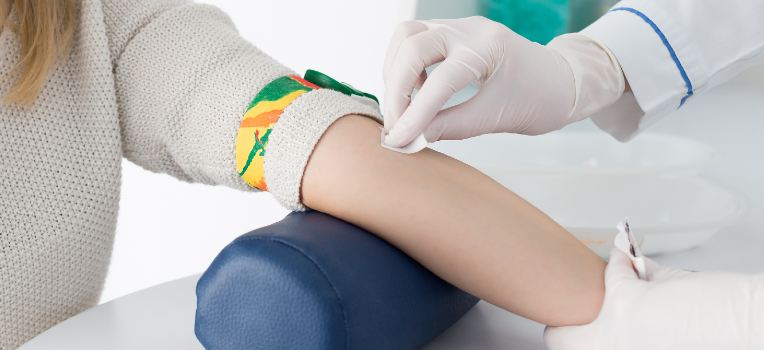The Clomid Challenge Test (also known as the clomiphene citrate challenge test, or CCCT) is an infertility blood test used to measure a woman’s ovarian reserve — the health of her ovaries and the quality and quantity of the eggs (oocytes) they contain. While not as common as it once was, the CCCT can still provide insight into your fertility health.
Ovarian Reserve
The most common reason ovarian reserve declines is age, although certain lifestyle choices, like smoking, and other medical conditions/treatments—like chemotherapy, radiation or, sometimes, genetics—can also affect your ovarian reserve.
Unlike men, who can produce sperm after puberty, a woman is born with her lifetime supply of eggs. At the start of each menstrual cycle, Follicle Stimulating Hormone (FSH) recruits and stimulates a follicle (the sac containing the egg inside the ovary), which becomes dominant and matures into an egg. Ovulation occurs when the mature egg is released from the ovary and is available to be fertilized.
Understanding Follicle Stimulating Hormone (FSH)
There is no perfect way to estimate ovarian reserve.
FSH works like a sliding scale. As ovarian reserve decreases, FSH levels measured at the beginning of a menstrual cycle increase. Abnormal (high) FSH levels can predict low fertility, researchers have found that women undergoing in vitro fertilization who had the highest levels of FSH had the lowest average pregnancy rates and the highest miscarriage rates.
Ovarian reserve testing is useful to help evaluate response to ovarian stimulation if needed for infertility treatment and to determine medication dosing. However, ovarian reserve tests are not great predictors of future fertility, since it takes only a single normal egg to create a pregnancy. Low ovarian reserve is associated with poorer infertility treatment outcomes.
Understanding the Clomid Challenge Test
The Clomid Challenge Test looks at FSH levels at two time points during the menstrual cycle. FSH is determined on Day 3, Clomid is administered on Days 5 through 9, and the FSH is retested on day 10 of the cycle.
“The Clomid Challenge Test is a measure of ovarian reserve that’s typically done to see how the brain responds to fooling it about estrogen levels,” says Eric Flisser, M.D., a fertility doctor with Reproductive Medicine Associates of New York. “When Clomid is administered and the brain can’t sense estrogen, it produces a limited amount of additional FSH.”
“When the response to Clomid is a high rise in the FSH level,” Dr. Flisser continues, “that could indicate the brain is having a more difficult time getting a response from the ovary and that ovarian reserve is diminished.”
Clomid tends to elevate FSH levels; however, women with a normal response are able to return the FSH levels to baseline by day 10, while the day 10 FSH is often elevated in women with diminished ovarian reserve.
What Does a Poor Clomid Challenge Test Mean?
Regardless of your age, having a poor Clomid Challenge Test may indicate several things:
- lower response to injectable fertility drugs in assisted reproductive technology cycles
- fewer eggs retrieved
- lower pregnancy rate with IVF and intrauterine insemination (IUI)
- higher miscarriage rates
- increased risk for chromosomally abnormal embryos.
Some fertility clinics may not offer IVF to women who have a poor Clomid Challenge Test result.
Egg Quality
There is no accurate way to test the quality of your eggs or their potential to fertilize and develop. Poor quality is a term used when many of the eggs are genetically abnormal and incapable of producing normal pregnancies. While it’s possible to experience a regular menstrual cycle with high FSH levels, if your day 3 FSH test or your Clomid Challenge Test show elevated levels of FSH, this may indicate that the general quality of your eggs is poor. Poor quality eggs lower your likelihood of becoming pregnant and increases your likelihood of miscarriage if you do conceive. Poor quality eggs are associated with reproductive aging regardless of ovarian reserve.
Dr. Eric Flisser is Board Certified in Reproductive Endocrinology & Infertility and in Obstetrics & Gynecology. He is a Fellow of the American College of Obstetricians and Gynecologists, and a member of the American Society for Reproductive Medicine (ASRM) and the Society for Reproductive Endocrinology and Infertility (SREI). He is also a member of the New York-Metropolitan Embryologist Society. His professional interests include reproductive surgery, in vitro fertilization and oocyte donation. Dr. Flisser is an Assistant Clinical Professor in the Department of Obstetrics, Gynecology and Reproductive Science at the Icahn School of Medicine of the Mount Sinai Medical Center and also has admitting privileges at Lenox Hill Hospital in Manhattan and Winthrop University Hospital in Mineola, New York.
